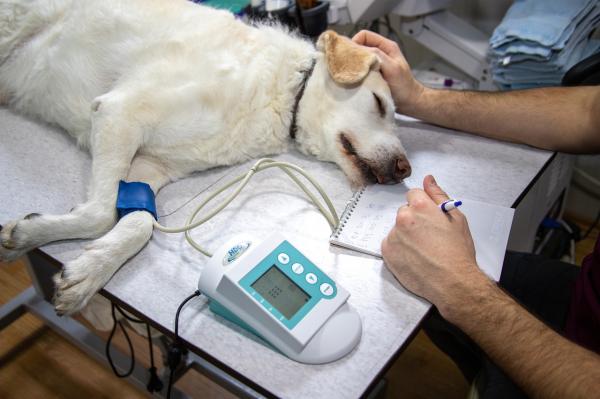My Dog Walks Like He's Drunk



See files for Dogs
When a dog begins to walk abnormally, it means there is a problem. Whether this is temporary or chronic depends on the cause. Some guardians might see their dog walking as if they are drunk and find it funny. However, it is important to know that this is a serious issue which needs to be resolved. The word for this ‘drunken’ gait is ataxia and it has various causes, both physiological and neurological. Unfortunately, diagnosis can be difficult, so we need to take the dog to a veterinarian where exhaustive tests may be carried out.
At AnimalWised, we ask why your dog walks like they're drunk? After explaining the reasons behind ataxia, we explain what can be done to help them.
Why does my dog walk like he's drunk?
When a dog seems to be walking with lack of coordination, loss of balance and staggering as if they were drunk or drugged, it means that they have ataxia. Not a disease in itself, ataxia is a symptom of disease which means they have an alteration i their gait. This lack of control occurs when the pathways that inform the brain about position and regulate movements and balance are disturbed for some reason.
Ataxia is a clinical sign caused by different diseases or disorders in dogs. Although we might at first assume there is a vestibular, spinal or cerebellar disease, it is actually a common sign of other neurological diseases. Other disorders can lead a dog to walk like they are drunk, including some infectious diseases.
The origin of this way of staggering, annoyed and with loss of balance can be due to the following causes :
- Intoxication
- Drug side effect
- Canine distemper
- Trauma to the head or spine
- Vestibular syndrome
- Diseases of the spinal cord
- Otitis (media or internal)
- Vestibular disease
- Vertebral or intervertebral infection
- Herniated disc
- Discoespondylitis
- Thiamine deficiency
- Brain tumor
- Wobbler syndrome
- Cerebellar disease
- Granulomatous meningoencephalitis
- Hypocalcemia
- Hypokalemia
- Hypoglycemia
- Sweeteners (xylitol)
Walking as if they are drunk is only one symptom and it would usually have other underlying causes. It can be accompanied by tilting of the head, abnormal movement of the eyes, anorexia and dizziness. If you notice that your dog is walking sideways, vestibular syndrome in dogs may be the cause.
For puppies, an inability to walk properly can be due to abnormal development. Take a look at our article on why my puppy is lying flat to know more.
In summary, in dogs we can find three main types of ataxia according to their origin:
- Proprioceptive or sensory ataxia: occurs when there is damage to the spinal cord and/or vertebrae and nerves.
- Vestibular ataxia: when damage occurs in the vestibular apparatus of the ear that governs balance.
- Cerebellar ataxia: when signs of cerebellar alteration are seen, such as exaggerated movements (hypermetry) and incoordination.
- Secondary ataxia: produced by external factors (trauma, medications, xylitol, toxic, etc.) and electrolyte or nutritional imbalances.
Symptoms of ataxia in dogs
When a dog seems drugged or walks as if they were drunk, it can correspond to a secondary sign of various disorders which have ataxia as a symptom. For this reason, it is common for incoordination to occur with symptoms associated with the original process in question.
The clinical signs that a dog with ataxia may show are the following:
- Motor incoordination
- Staggering
- Nystagmus
- Hypermetria
- Walking in circles
- Paresis
- Tremors
- Seizures
- Paresis
- Vomiting
- Nausea
- Dizziness
- Fever
- Pain
- Pinching
- Shortness of breath
- Bleeding
- Loss of balance
- Hearing loss
- Mental changes
- Confusion
- Anorexia
Diagnosis of ataxia in dogs
To diagnose the specific cause that is leading our dog to walk with an uncoordinated fait, the first thing the veterinarian will ask is to see a medical history. This should include vaccination, age, recent trauma, possibility of being in contact with some poison or medicine that can cause ataxia, how long they have had symptoms, if they are in pain or have any associated clinical signs. In this way, a clinical suspicion can be established.
Subsequently, a correct neurological diagnosis must be carried out in order to try to locate the injury or condition causing ataxia. A complete blood count and biochemistry should also be performed to inquire about possible electrolyte abnormalities or deficits. A sample of cerebrospinal fluid may be taken when a problem or infection in the nervous system is suspected.
To establish the definitive diagnosis, diagnostic imaging tests must be performed, specifically:
- X-ray
- Myelography (x-ray of the spinal cord)
- Magnetic resonance imaging (MRI scan)
- Computed tomography (CT scan)

What to do if my dog walks like he's drunk
Given the multiple causes that can lead to a gait disturbance in dogs, it is essential to go to the veterinary clinic for a professional to make the diagnosis and establish treatment. A dog that cannot walk suddenly should be treated as soon as possible.
Treatment will vary greatly depending on the origin of the dog's mobility problems and incoordination. Here are general treatments for each cause:
- When it is due to intoxication, the substance may be removed by stomach pump or an antidote applied if one is available. Other forms of purging may be used, but the type of treatment is time sensitive.
- If it is due to any drug, the medication should be stopped, the dose reduced or changed to another drug.
- If there are electrolyte or nutritional imbalances, they must be supplemented in order to reach adequate levels. A change in diet will also be likely.
- If there are bacterial infections, antibiotic therapy should be given.
- In the case of tumors, the appropriate treatment must be applied according to the case (chemotherapy, radiotherapy, surgery, etc.).
- In certain cases, a surgical intervention must be carried out, such as in cases of severe compressive herniated discs or certain tumors.
- In some cases,rest and anti-inflammatory therapy may suffice.
- In the presence of moderate to severe pain, analgesics should be administered to manage the pain.
- If there is vomiting, antiemetics can be used.
- If it is due to canine distemper, the specific symptomatic treatment should be applied.
- In some cases, and especially after surgery, it may be advisable for the dog to undergo physical therapy sessions.
As we have seen, the causes of loss of balance in dogs are varied. If you suspect that your dog may be developing ataxia, you should urgently go to a veterinary center to have its cause diagnosed and treated as soon as possible.
This article is purely informative. AnimalWised does not have the authority to prescribe any veterinary treatment or create a diagnosis. We invite you to take your pet to the veterinarian if they are suffering from any condition or pain.
If you want to read similar articles to My Dog Walks Like He's Drunk, we recommend you visit our Neurological diseases category.
- A. Cancela, A. Seoane, L. Espino. (2020). Neurology clinical case. Available at: https://www.clinvetpeqanim.com/index.php?pag=articulo&art=157
- J. Cerón, MJ Fernández, C. García, M. Hervera, SM Angulo, D. Pérez, C. Pérez, G. Santamarina. (2016). Small Animal Internal Medicine Clinical Manual I. ESVPS, Ed. SM Publishing Ltd. Sheffield, UK.
- J. López. Ataxia, the cause of physical incoordination in dogs . Available at: https://www.animalshealth.es/mascotas/la-ataxia-causante-de-la-descoordinacion-fisica-en-los-perros






